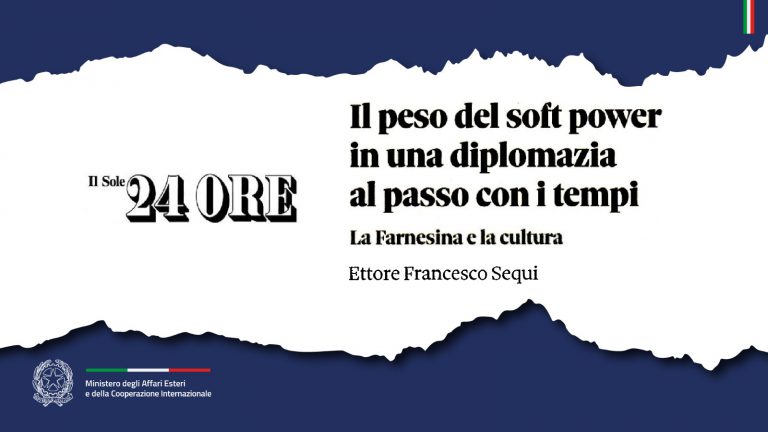Right now, Italy enjoys an excellent global image. It should be acknowledged that a good part of this reputation comes from being a cultural superpower: it is the Country of history, art, civilization, savoir vivre, beauty, and of things perfectly crafted. Little does it matter if it is a stereotype or inspired by love: this is the main (and anti-cyclical) factor of Italy’s global reputation. While this is difficult not to acknowledge by any Italian citizen crossing Italy’s national borders, it would be unforgivable for anyone called upon to head the diplomacy of a Country such as Italy. Performing one’s duties without exploiting this soft power would be tantamount to depriving oneself of a tool that is as intangible as it is effective: a Non-Fungible Token (NFT) of inestimable value to be cashed in when having to protect our interests, assist our citizens and enterprises around the world, and promote an international agenda grounded on peace, development, and the protection of human rights. Under the leadership and impulse of Minister Luigi Di Maio, in order to spend this “Non-Fungible Token” even better, we have reformed the Italian Foreign Ministry and created a new General Directorate for Public and Cultural Diplomacy with the aim of turning our global image into an ever-more effective instrument in influencing and building global consensus on issues that we consider to be of priority interest. Its objectives include revitalizing cultural diplomacy. It represents a formidable factor of the integrated promotion strategy underlying the way we have externally projected our “Country System” over the last few years. However, the current international context is one in which cultural diplomacy takes on an increasingly political, and to some extent, competitive profile. Italy must be capable of playing the global role it deserves. Through the new General Directorate, we intend to strengthen the network of 84 Italian Cultural Institutes, which will become 90 in 2022, with Institutes opening in Almaty, Amman, Bangkok, Hanoi, Miami and Sarajevo; of the 7 Italian public schools and the 42 officially recognized private schools in the world; of the 130 Italian lecturers working at foreign universities. We intend to further promote publishing activities, student and researcher mobility, as well as archaeological, ethnological and anthropological missions abroad. We intend to have greater echo in multilateral cultural cooperation starting from UNESCO, in whose World Heritage Committee Italy is sitting again after 20 years. We intend to promote the attractiveness of Italian Higher Education through networks of foreign alumni awarded scholarships or involved in exchange programmes financed by Italy. The Italian culture and language in the world contribute to develop Italian-speaking and Italy-loving ruling classes, build on the identity and historical traits of friendly (and appreciative) Countries that we assist through our archaeological and ethno-anthropological competence, facilitate dialogue in sensitive scenarios, and ultimately foster peace and stability. The new General Directorate, led by Ambassador Pasquale Terracciano, is already designing strategies for our key lines of action: not only a more effective cultural diplomacy but also more incisive communication, a more widespread and predictive planning and analysis, a more extended Italian presence in international organizations. The demand for communication addressed to the Foreign Ministry has grown, obliging us to respond, adjust and create content but also to make an intelligent interpretation of third-party content. International scenarios change rapidly, and our interests are increasingly at play in the international organizations of which we are members: our candidacy policy must once again become unitary and our support to present and future Italian officials must be consistent. While the integration of these responsibilities represents the value added of the new Directorate, the new enterprising spirit behind our opening up to the external world represents the sum total. The opening must involve the national and international civil society and public, including those segments that still see us through the prism of unfounded stereotypes. It shall be accompanied by continuous dialogue and a preparatory, more than reactive, narrative. It will involve the media, universities, enterprises, cultural institutions, think tanks, associations, local communities and the digital community. The match for an effective public diplomacy must be played on a different arena from that of the relations between governments: a physical and virtual arena, the outcome of the evolution of civilization from analog to digital well described by Alessandro Baricco in The Game. If it is true, as Baricco writes, that we have migrated into a new, fluid, virtual and intangible world, we will stand thanks to our best oxymoron: the intangible weight of our soft power.


